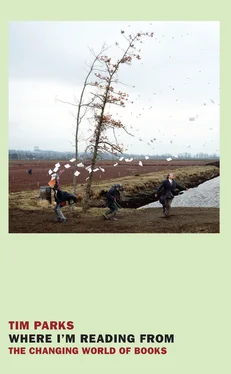Why do those “usual reliable translators” often give us work that we feel is wooden or lackluster, thus inviting the poets to get involved? Teaching translation, I frequently deal with students who write well in their mother tongue, but whose translations into that tongue lack fluency. This brings us to a paradox at the heart of translation: the text we take as inspiration is also the greatest obstacle to expression. Our own language prompts us in one direction, but the text we are trying to respect says something else, or says the same thing in a way that feels very different. All the same, what often frees the student to offer better translations is a deeper knowledge of the language he is working from: a better grasp of the original allows the translator to detach from formal structures and find a new expression for the tone he is learning to feel: in this case, however, every departure from strict transposition is inspired by an intimate and direct experience of the original.
All this to arrive at the obvious conclusion that while expression and creativity in one’s own language is crucial, a long experience in the language we are working from can only improve the translations we make. But the really interesting question is: Why are such intelligent writers as Eliot, Lowell, Pasternak, Robertson, and McKendrick unwilling to consider the matter more carefully? Is it because, to return to Tranströmer, “We must believe in poetry translation, if we want to believe in World Literature”? There is no point, that is, in examining what we do too closely if we’ve already decided what we want our conclusion to be.
But why is it imperative that we believe in World Literature? It seems we must imagine that no literary expression or experience is ultimately unavailable to us; the single individual is not so conditioned by his own language, culture, and literature as not to be able to experience all other literatures; and the individual author likewise can be appreciated all over the globe. It is on this premise that all international literary prizes, of which there are now so many, depend. The zeitgeist demands that we gloss over everything that makes a local or national culture rich and deep, in order to believe in global transmission. There must be no limitation.
I have no quarrel with the aspiration, or all the intriguing translation/imitation processes it encourages. My sole objection would be that it is unwise to lose sight of the reality that cultures are immensely complex and different and that this belief in World Literature could actually create a situation where we become more parochial and bound in our own culture, bringing other work into it in a process of mere assimilation and deluding ourselves that, because it sounds attractive in our own language, we are close to the foreign experience. Tranströmer remarks:
I perceived, during the first enthusiastic poetry years, all poetry as Swedish. Eliot, Trakl, Éluard—they were all Swedish writers, as they appeared in priceless, imperfect, translations.
Try this experiment: pick up a copy of a book mis-titled Dante’s Inferno . It offers twenty celebrated poets, few of whom had more than a passing knowledge of Italian, each translating a canto of the Inferno . Inevitably, the result is extremely uneven as in each case we feel the Italian poet’s voice being dragged this way and that according to each translator’s assumptions of what he might or might not have sounded like. Sometimes it is Seamus Heaney’s Inferno , sometimes it is Carolyn Forché’s, sometimes it is W. S. Merwin’s, but it is never Dante’s. Then dip into the 1939 prose translation by the scholar John Sinclair. There is immediately a homogeneity and fluency here, a lack of showiness and a semantic cohesion over scores of pages that give quite a different experience. To wind up, look at Robert and Jean Hollander’s 2002 reworking of Sinclair. Robert Hollander is a Dante scholar and has cleared up Sinclair’s few errors. His wife, Jean, is a poet who, while respecting to a very large degree Sinclair’s phrasing, has made some adjustments, under her husband’s meticulous eye, allowing the translation to fit into unrhymed verse. It is still a long way from reading Dante in the original, but now we do feel that we have a very serious approximation and a fine read.
LISTENING FOR THE JABBERWOCK
WHAT IS THE status of translated works of literature? Are they essentially different from texts in their original form? One of the arguments I have put forward is that there is a natural tendency toward rhythm, alliteration, and assonance when one writes even the most ordinary prose, and that editing to conform to the linguistic conventions of a different culture can interfere with this. The translator gives priority to the semantic sense, but that sense was also partly guided in the original by what one might call the acoustic inertia of the language.
Naturally, an alert and resourceful translator can sometimes come up with the goods. Here for example is a sentence from Joyce’s “The Dead”:
It hardly pained him now to think how poor a part he, her husband, had played in her life.
A monosyllabic onslaught of p ’s and h ’s—the husband is the bisyllabic odd man out—falls into a melancholic, mostly iambic rhythm. A masterful Italian translation by Marco Papi and Emilio Tadini gives:
Ora non gli dava quasi più pena pensare a quanta poca parte lui, suo marito, aveva avuto nella sua vita.
The Italian inevitably settles for bisyllables but finds a host of p ’s and a quiet, even rhythm to match the resigned tone of the English.
Such combinations of luck and achievement are rare, however, and mainly come in literary texts, poetry in particular, where the translator is prepared for the writer’s evident and strategic use of poetic devices. All too often, the generous attempt to match such devices—one thinks of Pinsky’s translation of the Inferno —only alert us to the strain and effort the translator has to make to force the language of translation into the desired sound patterns, patterns which in the original sounded easy and even natural. Meantime in novels, even the most evident poetic effects are often simply ignored. Here is D.H. Lawrence in Women in Love describing the combative Gudrun’s encounter with an equally combative rabbit, Bismark:
They unlocked the door of the hutch. Gudrun thrust in her arm and seized the great, lusty rabbit as it crouched still, she grasped its long ears. It set its four feet flat, and thrust back.
None of the translations I have looked at match Lawrence’s repetition of thrust to suggest a parallel between the woman and the rabbit, the way the violence of the one provokes the response of the other and puts both on the same level. Nor do they capture the nice way the word lusty ties the two thrusts together soundwise: none of them begins to recover the stubbornness and economy of “set its four feet flat.” It is not a question of poor translation; the text was created in English and that is that. This is what Paul Celan, despairing of translating Baudelaire, called “the fatal uniqueness of language,” when the creative mind, deeply integrated within a set of native sound patterns, produces something that can exist exclusively in that language.
Another way of approaching the question of what is different about translation might be to look at a text where the usual relation between semantics and acoustic effects is radically altered. Everybody knows the opening of Lewis Carroll’s “Jabberwocky”:
’Twas brillig, and the slithy toves
Did gyre and gimble in the wabe:
All mimsy were the borogoves,
And the mome raths outgrabe.
Читать дальше












